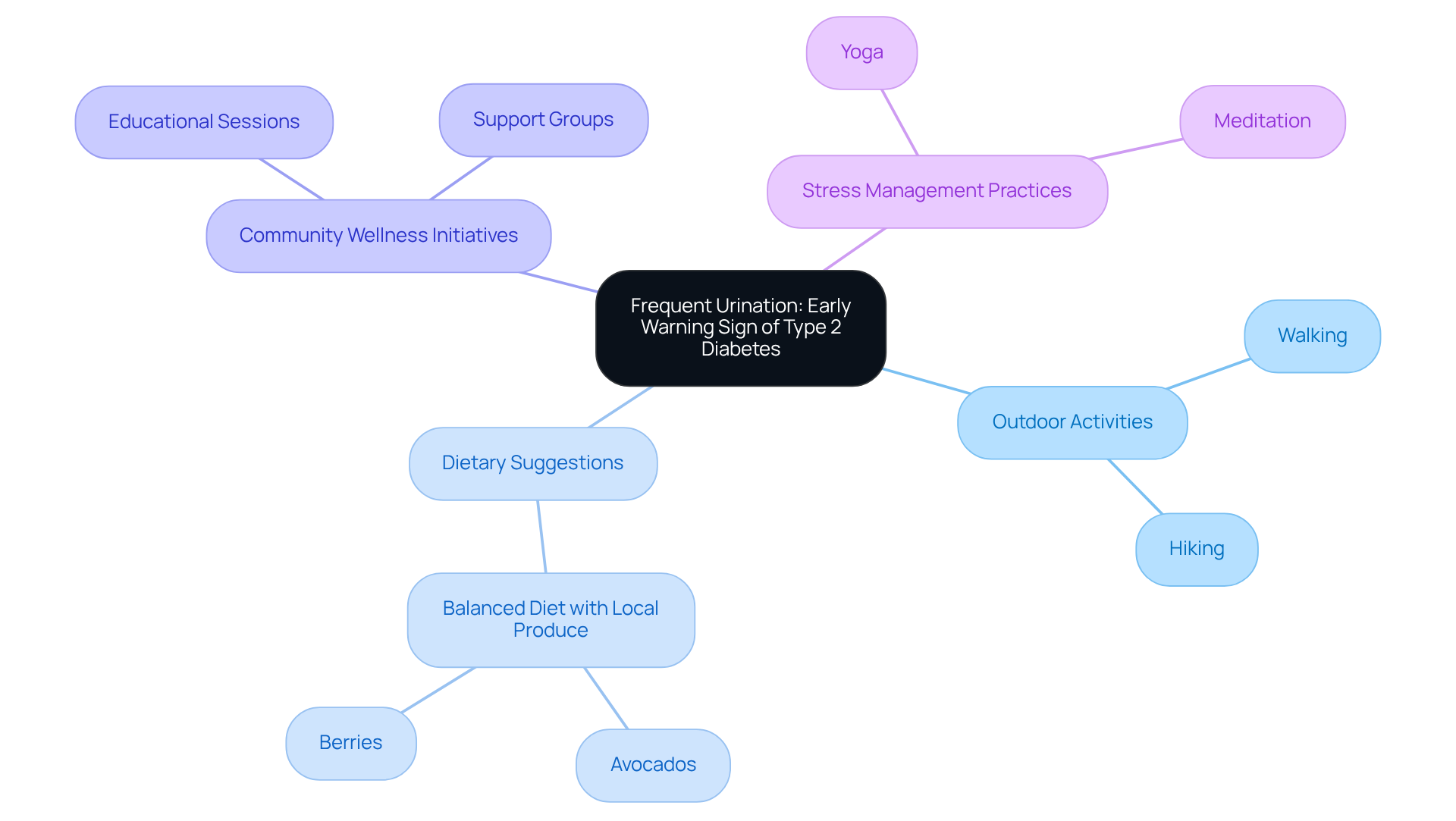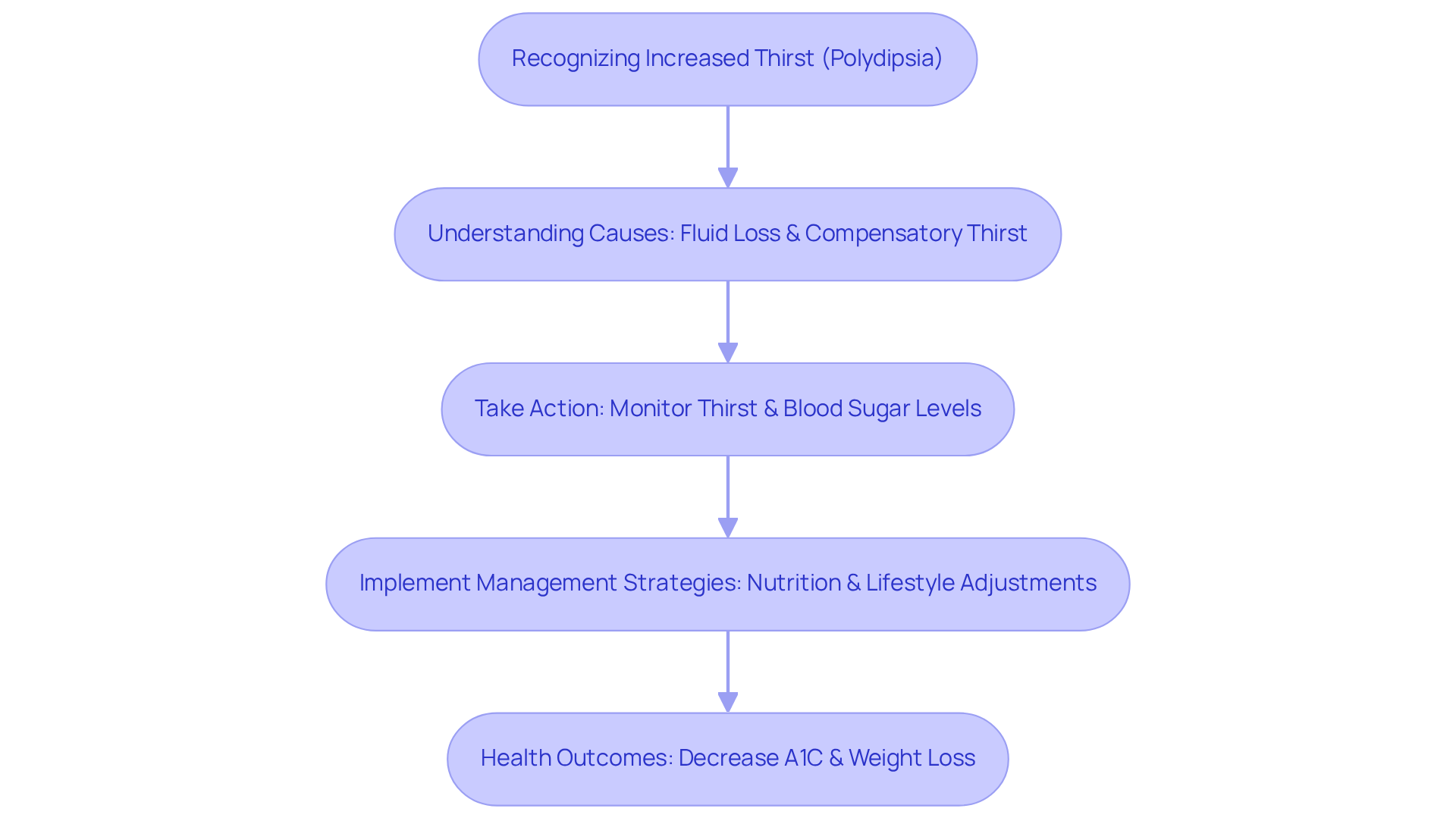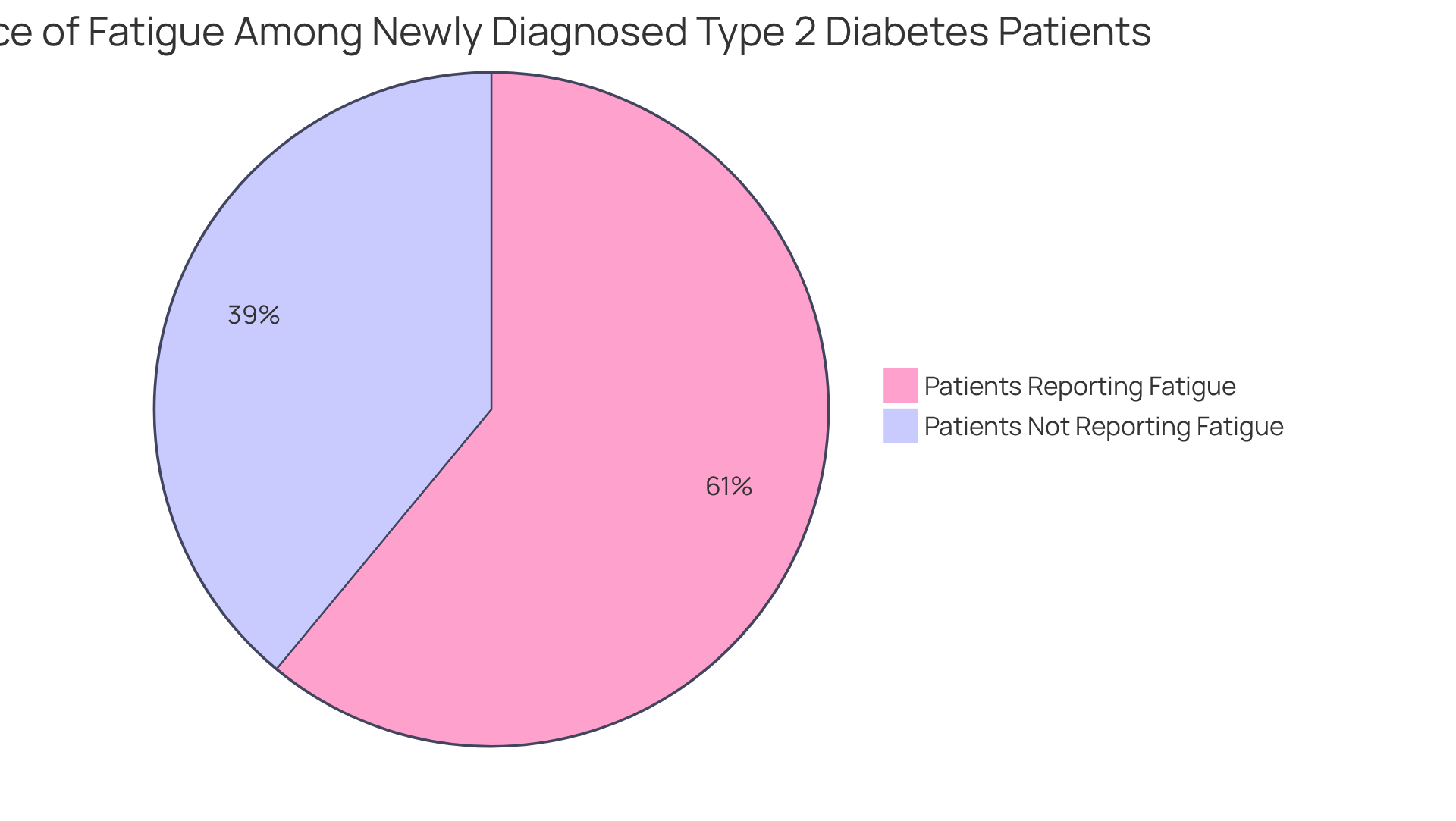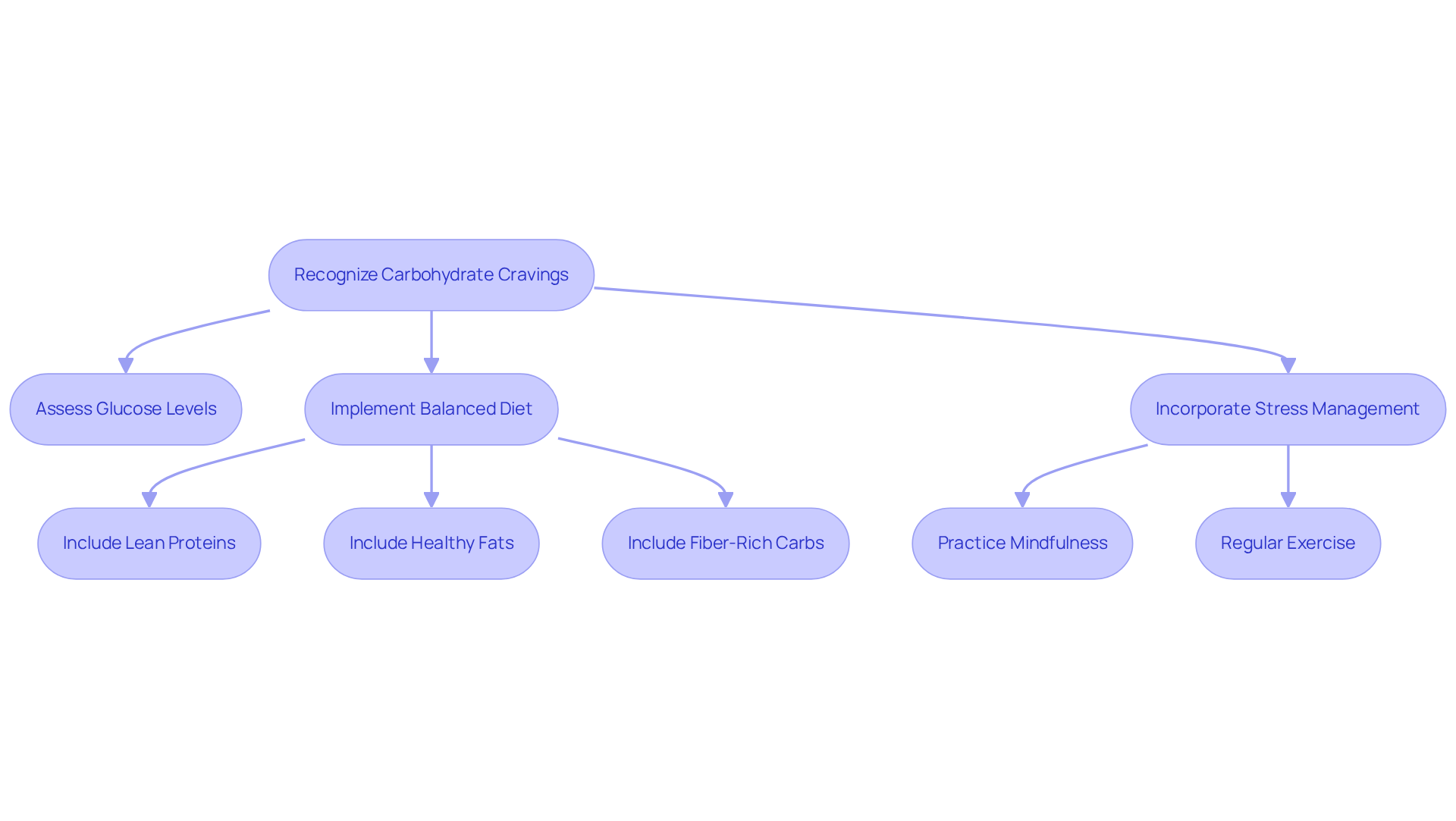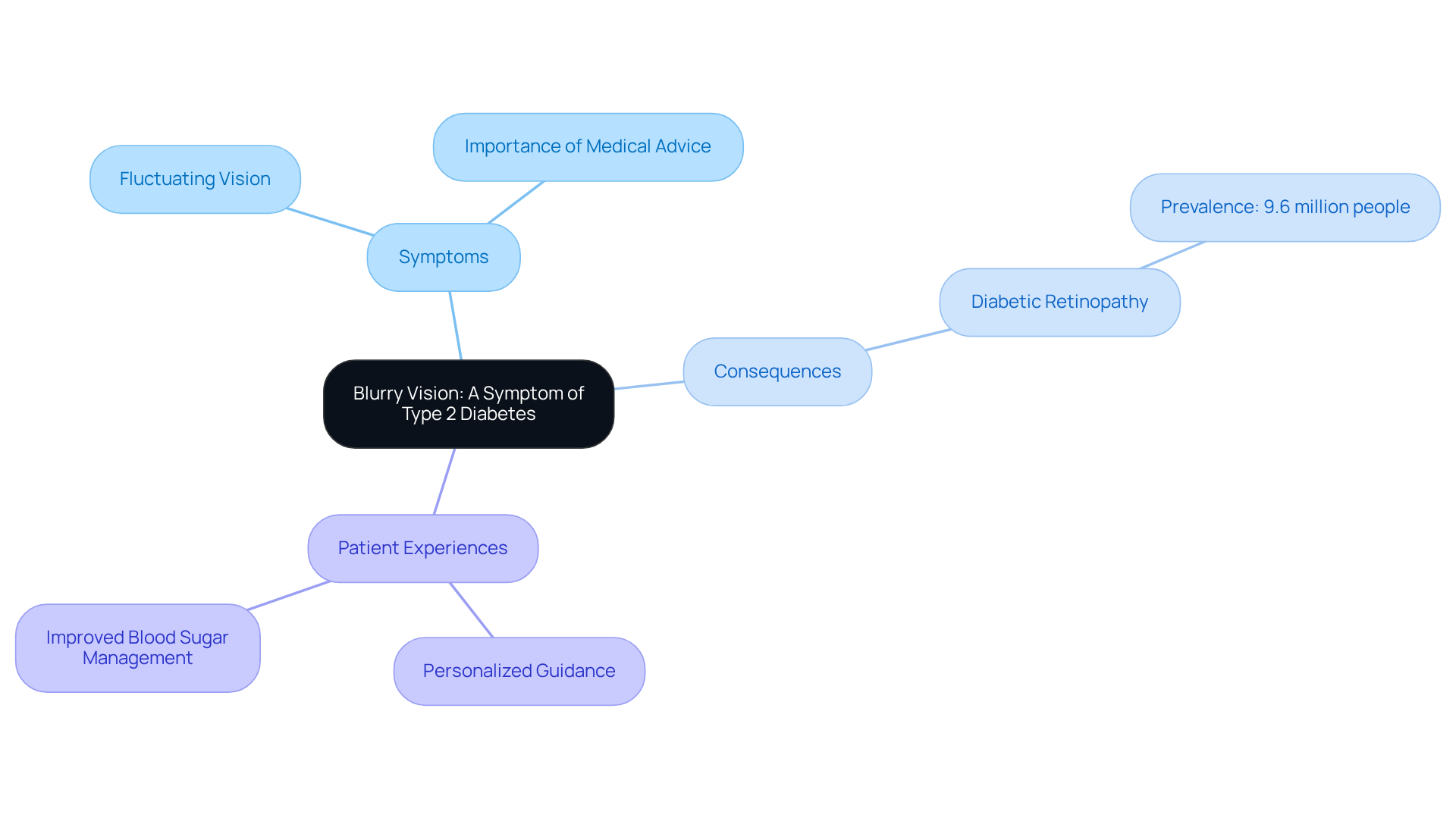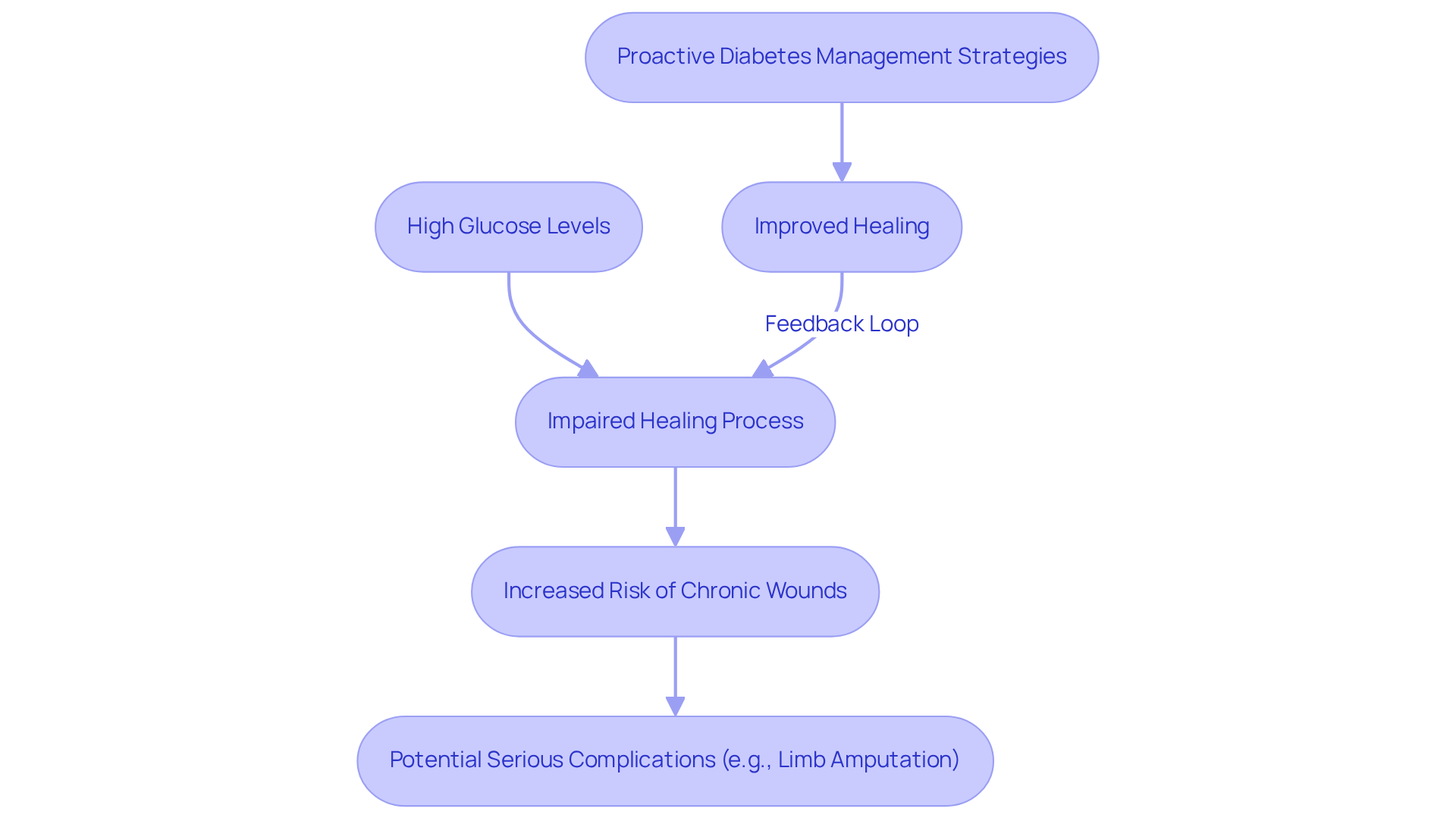Overview
It’s important to recognize the signs of type 2 diabetes, as they can significantly impact your well-being. Many individuals experience symptoms such as:
- Frequent urination
- Increased thirst
- Fatigue
- Carbohydrate cravings
- Blurry vision
- Slow healing of cuts
These signs should not be ignored; they are your body’s way of communicating that something is amiss.
Understanding these symptoms can be a challenging journey. You might find yourself feeling overwhelmed or uncertain about what to do next. However, acknowledging these signs is the first step toward taking control of your health. Early recognition is crucial, as it opens the door to effective management strategies.
So, what can you do? Proactive lifestyle changes and personalized support can make a significant difference in improving your overall health outcomes. Many patients discover that simple adjustments in their daily routine can lead to remarkable improvements in their symptoms. Remember, you’re not alone on this journey; support is available to guide you every step of the way.
Consider this: How might your life improve if you took action today? By participating in programs like the 30-Day Diabetes Reset, you can empower yourself to make lasting changes. Embrace the opportunity to transform your health and potentially reverse diabetes symptoms. Your journey toward a healthier life starts with recognizing the signs and seeking the support you deserve.
Introduction
Recognizing the signs of type 2 diabetes is crucial for early intervention and effective management. Yet, many individuals overlook these warning signals until complications arise. This article delves into seven key symptoms that should never be ignored.
It’s important to highlight the significance of awareness in maintaining health.
What happens when these signs go unrecognized?
How can understanding them empower you to take control of your health journey?
Together, we can navigate this path towards better health.
Integrative Wellness Center: 30-Day Diabetes Reset Program for Lasting Health Transformation
At the Integrative Wellness Center, we understand that recognizing the signs for type 2 diabetes can be a challenging journey. That’s why we are proud to offer our groundbreaking 30-Day Diabetes Reset Program, designed specifically to empower you to take control of your health. This clinically validated program focuses on personalized coaching, nutritional education, and practical tools, addressing the root causes of diabetes instead of just alleviating symptoms. Imagine learning how to implement sustainable lifestyle changes that lead to improved blood sugar control, renewed energy, and overall well-being.
Led by the compassionate Dr. Jason Shumard, D.C., who brings nearly 20 years of experience in functional medicine and specialized training in functional endocrinology and clinical nutrition, this program is crafted to foster lasting health transformations. Many patients find that participating in similar reset programs can lead to remarkable success. In fact, studies show that:
- 32% of individuals who completed such programs achieved remission of their Type 2 Diabetes.
- This may help in recognizing the signs for type 2 diabetes and is often accompanied by an average weight reduction of nearly 16 kg.
Isn’t that inspiring?
By focusing on comprehensive solutions and education, our program provides you with practical insights and strategies that promote a proactive approach to managing your condition. The emphasis on personalized coaching ensures that you receive tailored support, enhancing your ability to make effective lifestyle changes. It’s important to recognize that you are not alone in this journey; we are here to guide you every step of the way.
Overall, the 30-Day Reset Program exemplifies a contemporary and compassionate method to managing blood sugar conditions and recognizing signs for type 2 diabetes. We prioritize education and empowerment to facilitate long-term health improvements. If you’re ready to take the next step toward a healthier you, contact us today to learn more about the program and register. Together, we can make a difference in your health journey!
Frequent Urination: A Key Early Warning Sign of Type 2 Diabetes
Frequent urination, or polyuria, can be concerning, especially when it presents signs for type 2 diabetes due to excess glucose in your bloodstream. This condition often leads to increased urination, particularly at night. Have you noticed a need to urinate more frequently than usual? This could be one of the signs for type 2 diabetes, suggesting that your glucose levels are high, which may require further examination and potential lifestyle changes. Embracing a holistic approach to managing type 2 diabetes can profoundly impact your overall health.
In San Marcos, CA, consider incorporating regular outdoor activities, such as:
- Walking
- Hiking in the beautiful parks and trails
Many patients find that these activities not only improve insulin sensitivity but also help regulate glucose levels. Additionally, focusing on a balanced diet rich in local produce—like avocados and berries—can support your nutritional needs while managing glucose levels effectively.
Engaging in community wellness initiatives, such as:
- Educational sessions
- Support groups
can provide you with valuable resources tailored to managing blood sugar levels. It’s important to recognize that integrating stress management practices, such as yoga or meditation, can also play a crucial role in maintaining healthy glucose levels. By making these thoughtful lifestyle changes, you can effectively address the underlying factors contributing to symptoms like frequent urination.
Increased Thirst: Recognizing a Common Symptom of Type 2 Diabetes
Elevated thirst, medically referred to as polydipsia, is a common sign for type 2 diabetes mellitus. This condition often arises when the body loses fluids due to frequent urination, leading to a compensatory thirst response. Have you ever felt an unquenchable thirst, even after drinking enough water? This could indicate difficulties in managing your blood sugar levels. Recognizing this symptom early is crucial; it can pave the way for timely interventions and more effective management strategies.
According to endocrinologists, addressing polydipsia not only helps relieve symptoms but also plays a vital role in preventing further complications associated with diabetes. Many patients find that actively monitoring and managing their thirst leads to enhanced overall health outcomes. For instance, individuals participating in Dr. Jason Shumard’s 30-Day Diabetes Reset program have experienced remarkable health improvements, including:
- A decrease in A1C readings from 9.1 to 5.7
- Weight loss of up to 55 lbs
By acknowledging polydipsia as one of the signs for type 2 diabetes, you can take proactive steps toward effective health management. Personalized guidance and holistic methods, such as tailored nutrition and lifestyle adjustments, can empower you to potentially reverse your situation. Remember, you are not alone on this journey, and support is available to help you thrive.
Fatigue: Understanding Its Role as a Symptom of Type 2 Diabetes
Tiredness is a common concern for individuals showing signs for type 2 diabetes, often stemming from increased glucose levels that hinder the body’s ability to effectively utilize glucose for energy. This disruption can lead to persistent feelings of tiredness and lethargy, which may linger even with adequate rest. It’s important to recognize that studies show approximately 61% of newly diagnosed patients report experiencing fatigue, which is one of the signs for type 2 diabetes, throughout the day. If you find yourself struggling with ongoing tiredness, it may be essential to evaluate your glucose levels and consider lifestyle changes that can enhance your energy and overall well-being.
Many patients find that adopting a nutritious diet rich in whole grains, fresh fruits, and vegetables, along with regular exercise, can significantly boost energy and help manage blood sugar levels more effectively. Additionally, establishing a consistent sleep routine and seeking social support can further alleviate feelings of exhaustion. Remember, taking these steps empowers you to take control of your health and feel more vibrant in your daily life.
Carbohydrate Cravings: A Potential Indicator of Type 2 Diabetes
Many people with type 2 diabetes experience strong urges for carbohydrates, which can signal challenges with glucose management. These cravings often arise from fluctuations in glucose levels, prompting the body to seek quick energy sources. If you find yourself frequently craving sugary or starchy foods, these could be signs for type 2 diabetes that your blood sugar isn’t being managed effectively. It’s important to recognize that focusing on balanced meals—rich in lean proteins, healthy fats, and fiber-rich carbohydrates—can be a powerful way to combat these cravings. Coupled with stress management techniques and targeted supplements, this approach not only helps stabilize your energy but also reduces the likelihood of cravings.
For instance, Priya, a 45-year-old woman diagnosed with type 2 sugar intolerance, discovered that by changing her diet to include whole grains, proteins, and vegetables, her cravings diminished significantly, and her energy levels improved. Nutritionists emphasize that understanding the link between glucose levels and food cravings is crucial for effectively managing health conditions. By embracing a nutrient-dense diet, keeping track of glucose measurements, and incorporating regular exercise to enhance insulin sensitivity, you can take control of your cravings and boost your overall wellness.
Furthermore, many patients find that implementing structured goal-setting strategies empowers them on their health management journey, fostering accountability and motivation. Remember, you are not alone in this journey, and small, consistent changes can lead to significant improvements in your health and well-being.
Blurry Vision: An Important Symptom of Type 2 Diabetes
Blurry vision often serves as a crucial early warning among the signs for type 2 diabetes. Increased glucose levels can lead to swelling in the lens of the eye, causing temporary changes in vision. Many patients find that their vision fluctuates throughout the day, which can understandably be concerning. If you notice these symptoms, it’s important to seek medical advice. Early intervention can significantly lower the risk of developing more serious conditions, such as diabetic retinopathy. In fact, an estimated 9.6 million people in the United States are living with diabetic retinopathy, underscoring the importance of addressing vision changes promptly.
At Integrative Wellness Center, real-life experiences from patients reveal that recognizing these signs early has made a difference. Supported by Dr. Jason Shumard’s holistic approach and personalized guidance, many have felt empowered to take control of their health. They often report improved management of their blood sugar levels and overall well-being. This illustrates how customized functional medicine strategies can effectively address early symptoms like blurry vision.
Have you experienced similar challenges? To learn more about these transformative journeys, we invite you to explore all patient stories. Remember, you are not alone on this path to better health.
Slow Healing of Cuts: A Crucial Sign of Type 2 Diabetes Complications
Delayed recovery of cuts and injuries can be a significant concern for those managing high glucose levels. It’s important to recognize that elevated glucose can greatly hinder circulation and nerve activity, complicating the body’s natural healing processes. This often leads to prolonged recovery times, even for minor injuries. Many patients find that they are not alone in this struggle; research shows that up to 25% of diabetics may develop chronic wounds, with some facing infections that could escalate to serious complications, including limb amputation.
If you notice that minor cuts or scrapes are taking longer to heal than usual, it may indicate signs for type 2 diabetes that your diabetes management needs attention. Effective glucose management is essential for your well-being. Studies indicate that elevated glucose levels are linked to increased inflammation and slower wound healing. By seeking medical advice and implementing strategies to manage your blood sugar, you can significantly enhance your healing process and overall health outcomes.
As healthcare professionals emphasize, timely intervention is key to preventing complications associated with non-healing wounds. Remember, you are not alone in this journey. It’s crucial to stay vigilant in your diabetes management. Taking proactive steps can make a meaningful difference in your health and healing.
Conclusion
Recognizing the signs of type 2 diabetes is crucial for timely intervention and effective management. It’s important to be aware of key symptoms such as:
- Frequent urination
- Increased thirst
- Fatigue
- Carbohydrate cravings
- Blurry vision
- Slow healing of cuts
Each of these indicators serves as a warning sign, empowering individuals to take proactive steps toward better health and prevent potential complications associated with diabetes.
Many patients find that a holistic approach to managing diabetes is essential. From dietary changes and regular exercise to personalized coaching through programs like the 30-Day Diabetes Reset Program at the Integrative Wellness Center, there are effective strategies available to address symptoms and improve overall well-being. Empowerment through education and support is vital in navigating this health journey, ensuring that no one has to face these challenges alone.
Ultimately, awareness of these signs and symptoms is the first step in taking control of one’s health. By staying vigilant and seeking appropriate guidance, individuals can make informed decisions that lead to lasting health transformations. Embrace the journey to better health and consider reaching out for support to effectively manage diabetes and enhance your quality of life.
Frequently Asked Questions
What is the 30-Day Diabetes Reset Program offered by the Integrative Wellness Center?
The 30-Day Diabetes Reset Program is a clinically validated program designed to help individuals take control of their health by focusing on personalized coaching, nutritional education, and practical tools to address the root causes of type 2 diabetes.
Who leads the 30-Day Diabetes Reset Program?
The program is led by Dr. Jason Shumard, D.C., who has nearly 20 years of experience in functional medicine and specialized training in functional endocrinology and clinical nutrition.
What are some potential outcomes of participating in the 30-Day Diabetes Reset Program?
Studies indicate that 32% of individuals who completed similar programs achieved remission of their type 2 diabetes, with an average weight reduction of nearly 16 kg.
How does the program support individuals in making lifestyle changes?
The program emphasizes personalized coaching, providing tailored support and practical insights that promote a proactive approach to managing diabetes and implementing sustainable lifestyle changes.
What is frequent urination, and how is it related to type 2 diabetes?
Frequent urination, or polyuria, can be a key early warning sign of type 2 diabetes, often caused by excess glucose in the bloodstream, which leads to increased urination, particularly at night.
What lifestyle changes can help manage blood sugar levels effectively?
Engaging in regular outdoor activities like walking and hiking, focusing on a balanced diet rich in local produce, and participating in community wellness initiatives such as educational sessions and support groups can help manage blood sugar levels.
How can stress management practices impact glucose levels?
Integrating stress management practices such as yoga or meditation can play a crucial role in maintaining healthy glucose levels and addressing underlying factors contributing to symptoms like frequent urination.

